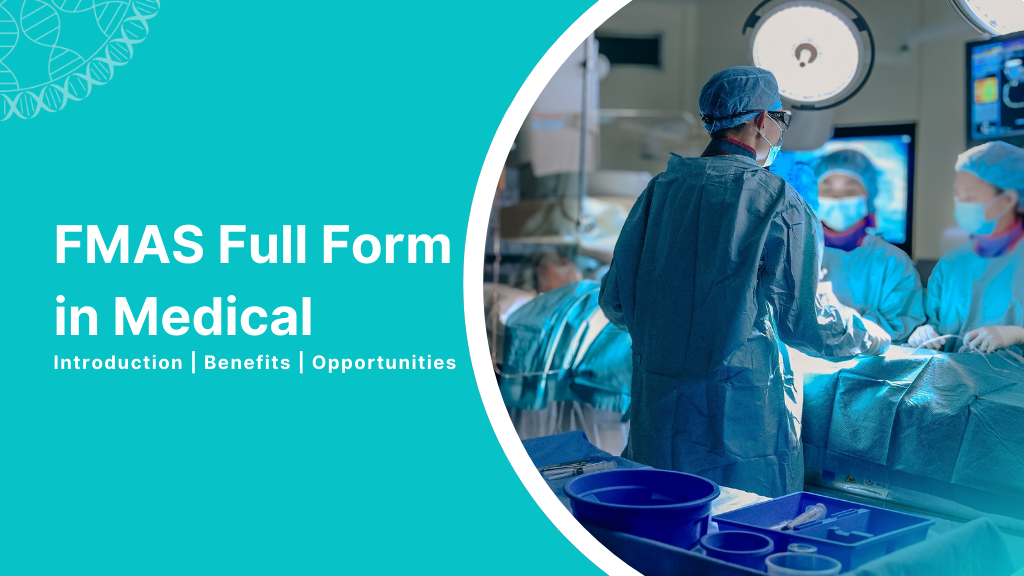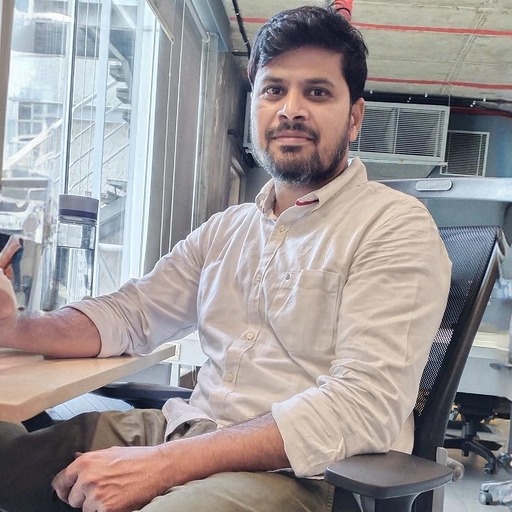
FMAS Full Form in Medical: Complete Guide to Fellowship in Minimal Access Surgery

11-Nov-2024
FMAS Full Form in Medical: Complete Guide to Fellowship in Minimal Access Surgery
Table of Contents
- Introduction: What is FMAS in Medical?
- Understanding FMAS Full Form and Significance
- Minimal Access Surgery: An Overview
- Why Pursue FMAS? Benefits and Scope
- FMAS Eligibility Criteria and Admission Requirements
- Detailed Curriculum and Study Modules
- Benefits of Minimal Access Surgery Training
- FMAS vs. DMAS: A Comparison
- Top Institutes Offering FMAS in India
- How to Apply for FMAS
- Career Opportunities and Prospects after FMAS
- FMAS in Medical: Frequently Asked Questions (FAQs)
- Conclusion: Final Thoughts on FMAS
1. Introduction: What is FMAS in Medical?
In the medical field, FMAS stands for Fellowship in Minimal Access Surgery. This fellowship program equips healthcare professionals, particularly surgeons, with specialized skills in minimally invasive techniques, including laparoscopic and endoscopic surgeries. These techniques involve making small incisions to conduct surgeries, which results in less pain, faster recovery times, and minimal scarring for patients. The FMAS certification is highly valued and represents a surgeon’s commitment to advancing patient care using the latest technology in surgery.

2. Understanding FMAS Full Form and Significance
The FMAS full form is Fellowship in Minimal Access Surgery. It is recognized in the healthcare industry as a post-graduate level program that allows qualified surgeons and medical practitioners to gain hands-on experience in minimally invasive procedures. FMAS-certified professionals are trained to handle advanced surgical instruments, operate laparoscopes, and perform surgeries with precision and care, offering patients a better recovery experience.
3. Minimal Access Surgery: An Overview
Minimal Access Surgery (MAS), also known as minimally invasive surgery, is a modern technique where surgeries are performed through small incisions rather than large openings. This approach offers many advantages, such as:
- Reduced Pain: Smaller incisions mean less pain post-operation.
- Quick Recovery: Patients recover faster, reducing hospital stays.
- Minimal Scarring: Small incisions leave minimal to no scars.
- Enhanced Precision: Surgeons can operate with high precision, reducing risks.
MAS is increasingly popular in procedures like appendectomies, hernia repairs, and bariatric surgeries. The FMAS fellowship is a gateway for medical practitioners to master these innovative techniques.
4. Why Pursue FMAS? Benefits and Scope
FMAS is valuable for surgeons, general practitioners, and healthcare workers looking to specialize in minimally invasive surgery. Here’s why FMAS is a worthy pursuit:
- Enhanced Skillset: Surgeons gain skills in modern surgical techniques, making them more versatile.
- Better Career Opportunities: FMAS-certified professionals are in demand in hospitals and healthcare facilities worldwide.
- High Salary Potential: The expertise in minimal access surgery often leads to higher earnings.
- Patient-Centric Approach: Minimal access surgery focuses on patient well-being, reducing pain and improving recovery times.
5. FMAS Eligibility Criteria and Admission Requirements
To qualify for an FMAS program, candidates must meet certain eligibility criteria:
- Educational Background: A medical degree such as MBBS, MD, or equivalent is typically required.
- Work Experience: Some institutions prefer applicants with 2-3 years of work experience in the medical field.
- Basic Surgical Knowledge: Knowledge in basic surgery practices is beneficial.
- Each institution may have specific eligibility requirements, so it’s essential to review these before applying.
6. Detailed Curriculum and Study Modules
The FMAS curriculum is designed to provide a balance of theoretical knowledge and practical skills. Key study modules often include:
- Introduction to Minimal Access Surgery: Basics of MAS, types, and principles.
- Laparoscopy and Endoscopy Techniques: Understanding and mastering laparoscopic and endoscopic tools.
- Practical Hands-on Training: Working on simulators to practice surgical techniques.
- Patient Care in MAS: Pre-operative and post-operative care for MAS patients.
- Managing Surgical Complications: Identifying and addressing potential complications.
Table: FMAS Curriculum and Key Topics
Introduction to MAS:
- Principles, benefits, and types of Minimal Access Surgery (MAS).
Equipment Handling:
- Instrumentation, sterilization, and laparoscope usage.
Practical Skills Training:
- Simulated surgeries and real-time practice.
Patient Care Management:
- Patient safety and recovery processes.
Complication Management:
- Addressing risks and managing surgical complications.
7. Benefits of Minimal Access Surgery Training
Training in minimal access surgery comes with numerous benefits, including:
- Enhanced Technical Skills: Surgeons learn to handle high-tech surgical instruments.
- Higher Job Market Demand: Hospitals prefer surgeons skilled in MAS.
- Increased Patient Satisfaction: Patients experience less pain and faster recovery.
- Opportunities for Further Specialization: FMAS certification opens doors to further specialization and certifications.

8. FMAS vs. DMAS: A Comparison
Both FMAS (Fellowship in Minimal Access Surgery) and DMAS (Diploma in Minimal Access Surgery) are prestigious programs. Here’s a comparison to help understand their differences:
Table: FMAS vs. DMAS Comparison
FMAS (Fellowship)
- Duration: 1-2 months
- Focus: Primarily practical skills
- Eligibility: MBBS with experience
- Type: Fellowship
- Career Impact: Immediate job enhancement
DMAS (Diploma)
- Duration: 6-12 months
- Focus: Theory and practical combined
- Eligibility: MBBS, MD, or higher
- Type: Diploma
- Career Impact: Suitable for academic and practical roles
9. Top Institutes Offering FMAS in India
India has several reputable institutions offering FMAS programs:
- World Laparoscopy Hospital, Gurugram: Known for hands-on training and advanced equipment.
- AMASI (Association of Minimal Access Surgeons of India): Provides certification and regular training workshops.
- MGM University of Health Sciences: Offers comprehensive FMAS programs with state-of-the-art facilities.
These institutes offer FMAS programs with varying costs, typically between INR 1-3 lakhs.
10. How to Apply for FMAS
Applying for FMAS in India involves a few steps:
- Research Institutions: Choose an institute that best fits your needs and goals.
- Submit Application: Fill out an online or offline application and submit required documents like a resume, degree certificates, and experience proof.
- Entrance Examination: Some institutes may require a test or interview as part of the selection process.
11. Career Opportunities and Prospects after FMAS
FMAS certification opens a wide range of career opportunities, such as:
- Minimal Access Surgeon: Working in hospitals specializing in minimally invasive surgery.
- Laparoscopic Consultant: Providing consultation and surgical expertise in clinics or as part of healthcare teams.
- Academic Roles: Teaching minimal access surgery in medical schools or training centers.
- International Opportunities: Many countries value FMAS training due to its relevance in modern surgical practices.
12. FMAS in Medical: Frequently Asked Questions (FAQs)
1Q: What is the FMAS full form in medical?
Ans: The full form is Fellowship in Minimal Access Surgery.
2Q: Who is eligible to apply for FMAS?
Ans: Typically, those with an MBBS, MD, or equivalent and some surgical experience.
3Q: What is the duration of the FMAS program?
Ans: Most FMAS programs are completed within 1-2 months, depending on the institution.
4Q: How does FMAS benefit a surgeon’s career?
Ans: FMAS provides training in advanced surgical techniques, increasing employability and opening doors for specialization.
5Q: What is the average cost of FMAS in India?
Ans: The cost generally ranges between INR 1-3 lakhs.
13. Conclusion: Final Thoughts on FMAS
FMAS is a prestigious and highly beneficial fellowship for medical professionals looking to specialize in minimal access surgery. With high demand for MAS-certified professionals, this fellowship offers not only a pathway to advanced surgical skills but also a fulfilling career with the potential for growth and specialization. By choosing FMAS, healthcare professionals can contribute to a patient-centric approach in surgery, characterized by shorter recovery times, less pain, and greater precision.

AUTHOR

Related Jobs


